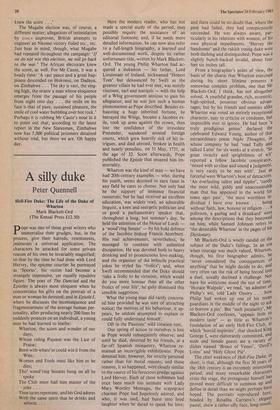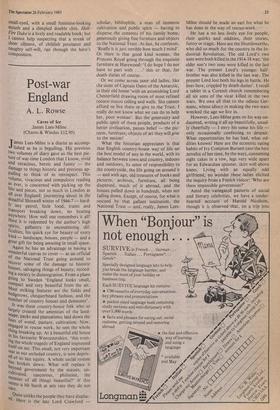A silly duke
Peter Quennell
Hell-Fire Duke: The Life of the Duke of Wharton Mark Blackett-Ord (The Kensal Press £12.50) pope was one of those great writers who immortalise their grudges, but, in the process, give their hatreds, resentments, jealousies a universal application. The characters he attacked for some private reason of his own he invariably magnified; so that by the time he had done with Lord Hervey, the epicene courtier he portrayed as `Sporus', his victim had become a strangely impressive, yet equally repulsive figure. The poet of The Dunciad and the Epistles is always most eloquent when he concentrates his gifts on the portrait of a man or woman he detested; and in Epistle !, where he discusses the inconsequence and fragmentariness of the average human per- sonality, after producing nearly 200 lines he suddenly pounces on an individual, a young man he had learned to loathe:
Wharton, the scorn and wonder of our days, Whose ruling Passion was the Lust of Praise; Born with whate'er could win it from the Wise, Women and Fools must like him or he dies; Tho' wond'ring Senates hung on all he spoke The Club must hail him master of the joke . . .
Then turns repentant, and his God adores With the same spirit that he drinks and whores . . . Here the modern reader, who has not made a special study of the period, may possibly require the assistance of an editorial footnote; and, if he needs more detailed information, he can now also refer to a full-length biography, a learned and well-documented work, despite its rather unfortunate title, written by Mark Blackett- Ord. The young Philip Wharton had ac- quired a dukedom — his father, Lord Lieutenant of Ireland, nicknamed 'Honest Tom' but denounced by Swift as the greatest villain he had ever met, was merely viscount, earl and marquis — with the help of a Whig government anxious to gain his allegiance; and he was just such a human phenomenon as Pope described. Besides ex- hausting a huge inherited fortune, he betrayed the Whigs, became a Jacobite ex- ile, took up arms against the crown, then lost the confidence of the irresolute Pretender, wandered around foreign courts, which grew heartily sick of his in- trigues, and died abroad, broken in health and nearly penniless, on 31 May, 1731, at the age of 32. Soon afterwards, Pope published the Epistle that ensured him im- mortality.
Wharton was the kind of man — we have had 20th-century examples — who, during his youth, seems destined to earn fame in any field he cares to choose. Not only had he the support of immense financial resources; but he had received an excellent education, was widely read, an admirable linguist, a keen and energetic politician and so good a parliamentary speaker that, throughout a long, hot summer's day, he held the attention of the House of Lords a 'wond'ring Senate' — by his bold defence of the Jacobite bishop Francis Atterbury. His real achievements, nevertheless, he managed to combine with unlimited dissipation. He was devoted both to heavy drinking and to promiscuous love-making, and the organiser of the imbecile practical jokes he styled his 'frolics'; and, when Swift recommended that the Duke should `take a frolic to be virtuous, which would do you more honour than all the other frolics of your life', he gaily dismissed this sensible suggestion.
What the young man did rarely concern- ed him provided he was sure of attracting notice; the motives of his behaviour, it ap- pears, he seldom attempted to explain or could fully understand himself.
Oft in the Passions' wild rotation tost, Our spring of action to ourselves is lost as Pope would subsequently observe; and until he died, deserted by his friends, at a far-off Spanish monastery, Wharton re- mained an incorrigible exhibitionist. Pope detested him, however, for strictly personal rather than for moral reasons; and those reasons, it so happened, were closely similar to the source of his ferocious grudge against Lord Hervey. Each of these noblemen had once been much too intimate with Lady Mary Wortley Montagu, the scapegrace charmer Pope had hopelessly adored, and who, it was said, had burst into loud laughter when he dared to speak his love; and there could be no doubt that, where the poet had failed, they had conspicuously succeeded. He was always aware, par- ticularly in his relations with women, of his own physical impediments. 'Hervey the handsome' and the rakish young duke were both dashing and distinguished; Pope was a slightly hunch-backed invalid, about four feet six inches tall.
From a biographer's point of view, the basis of the charm that Wharton exercised during his short lifetime presents a somewhat complex problem, one that Mr Blackett-Ord, I think, has not altogether solved. A youthful grandee, rich, eccentric, high-spirited, possesses obvious advan- tages; but by his friends and enemies alike Wharton was voted an entirely exceptional character, easy to criticise or condemn, but impossible ever to ignore. He had been 'a truly prodigious genius' declared the celebrated Edward Young, author of that extraordinary. poem Night Thoughts, in whose company he had 'read Tully and talked Latin' for six weeks at a stretch. 'So great vivacity and sprightliness of wit' reported a fellow Jacobite conspirator, `mixed with so clear and sound a judgment, is very rarely to be met with'. Just as forceful were Wharton's host of detractors. `An everlasting talker and tippler', `surely the most wild, giddy and unaccountable man that has appeared in the world for some ages past', 'the most worthless In- dividual I have ever known . . . being without faith, law, honour or religion . • • a poltroon, a gasbag and a drunkard' were among the descriptions that they bestowed on him; while Samuel Johnson refers to `the detestable Wharton' in the pages of his Dictionary.
Mr Blackett-Ord is wisely candid on the subject of the Duke's failings. In an era when courage was much valued, Wharton, though, his first biographer admits, he `never considered the consequences of anything' that he might decide to do, and very often ran the risk of being forced into a duel, usually declined a challenge. Nor have his witticisms stood the test of time. `Horace Walpole', we read, 'an admirer of Philip's wit, told Lady Ossory . . . how Philip had woken up one of his mean guardians in the middle of the night to ask to borrow a pin'. But 'such jocularity', Mr Blackett-Ord confesses, 'appeals little to modern taste' — as little as Wharton s foundation of an early Hell-Fire Club, at which 'horrid impieties', that shocked King George I, were elaborately committed, and male and female guests ate a variety 0! dishes named 'Breast of Venus', 'Devil s Loins' and 'Holy Ghost Pie'. The chief weakness of Hell-Fire Duke, in short, is that, although the first 30 years of the 18th century is an extremely interesting period, and many remarkable characters cross the stage, the protagonist himself has proved more difficult to summon up and define in detail than we might perhaps have hoped. The portraits reproduced here, headed by Rosalba Carriera's elegant pastel, show a rather silly face, long-nosed, small-eyed, with a small feminine-looking mouth and a dimpled double chin. Hell- Fire Duke is a lively and readable book; but I cannot help suspecting that a streak of sheer silliness, of childish petulance and naughty self-will, ran through the hero's composition.











































 Previous page
Previous page